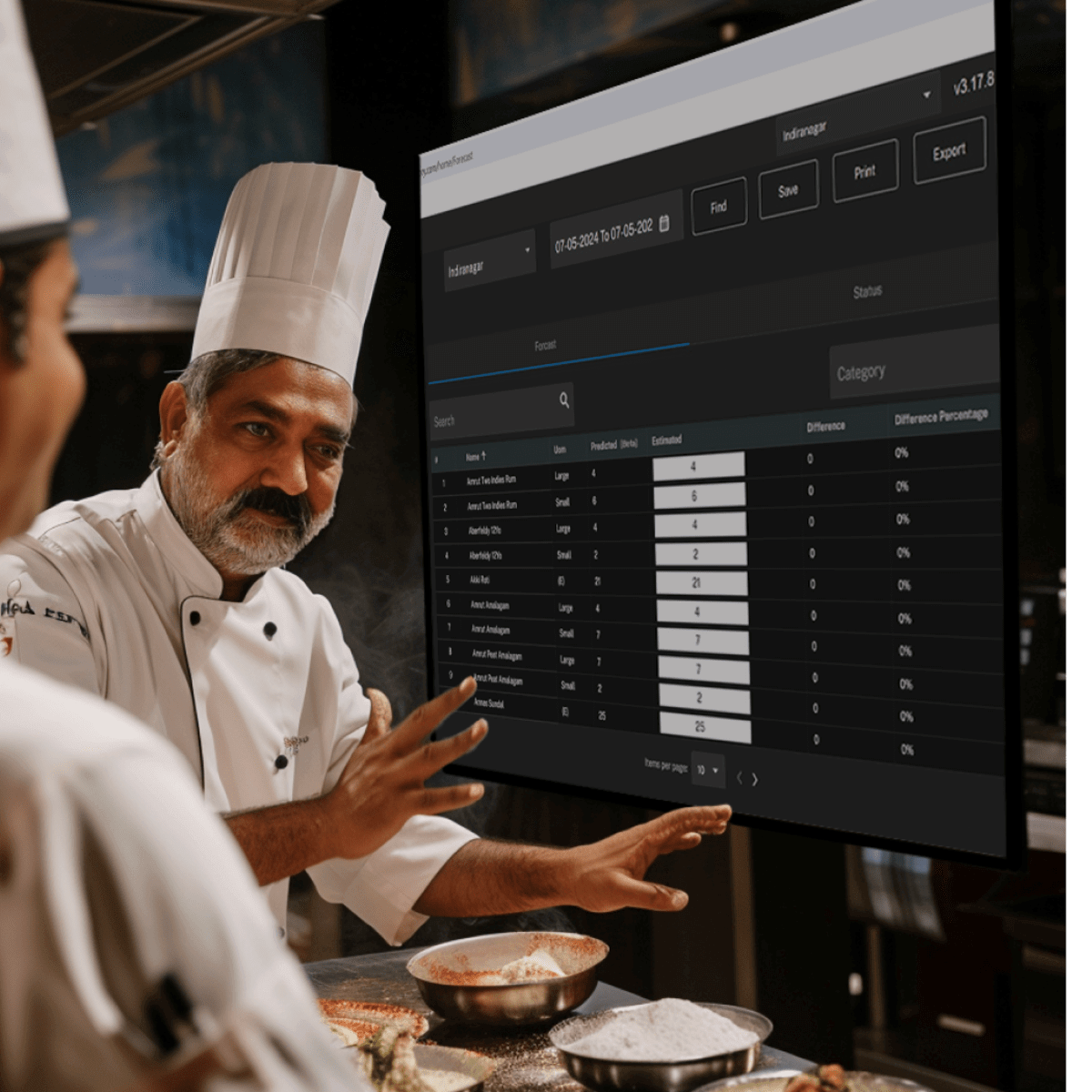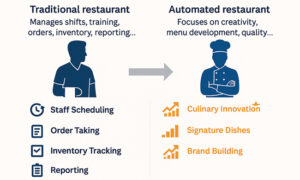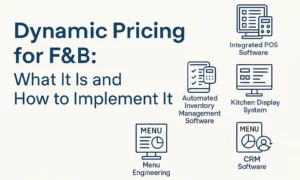
How to Choose the Right POS System for Your Restaurant (Checklist for 2025)
Your Restaurant's Profitability in 2025 Might Depend on This One Tech Decision
In 2025, a restaurant’s success is no longer driven solely by great food, ambiance, or location—it hinges on the intelligence and flexibility of your POS system. From inventory control to delivery integrations, customer loyalty to real-time analytics, your POS is now your most critical operational engine.
Whether you’re a QSR, fine-dine, café, bar, or cloud kitchen, the right POS system can improve efficiency, reduce costs, and enhance guest experiences. The wrong one? It can bleed profits silently.
This comprehensive blog is your restaurant POS system checklist for 2025. We break down what to look for, how to compare, and why integrated systems like Digitory are built for modern F&B growth in India.
What Is a Restaurant POS System?
A Point of Sale (POS) system for restaurants is a digital platform that handles:
- Order taking and billing
- Kitchen routing
- Payment processing
- Inventory and recipe management
- Staff performance tracking
- Customer engagement and loyalty
Modern POS systems go beyond transactions—they automate operations, centralize data, and enable real-time decisions.

Why Choosing the Right POS Matters in 2025
✅ Razor-Thin Margins
Rising food costs and labor shortages mean you must operate lean. Your POS must reduce manual work, automate decisions, and catch leakage.
✅ Multi-Channel Business Models
Restaurants today handle:
- Dine-in orders
- Takeaways
- Online deliveries (Swiggy, Zomato, ONDC)
- QR-based ordering
Your POS must centralize and unify these workflows.
✅ Data-Driven Growth
Insights drive scale. You need:
- Outlet-wise profitability
- Menu performance
- CRM engagement tracking
The right POS offers real-time dashboards and drill-downs.
✅ Staff Agility
With high staff churn, intuitive UI and role-based dashboards are essential.
The Ultimate POS System Checklist for Restaurants in 2025
- Order Management Features
- Multi-channel order taking (dine-in, online, QR, phone)
- Modifiers for add-ons/customizations
- Split bills and group orders
- Table mapping and floor plans
- Smart reordering for regular guests
- Kitchen Display System (KDS) Integration
- Real-time order routing to stations
- Prep time tracking
- Auto-prioritization
- Brand-coded display (for cloud kitchens)
- Payment & Billing Options
- Multiple payment methods (UPI, cards, wallets, BNPL)
- Integrated digital receipts
- Tip handling
- Dynamic GST/tax configurations
- Inventory & Recipe Management
- Ingredient-level tracking
- Auto deduction per order
- Expiry and reorder alerts
- Yield-based recipe costing
- CRM & Loyalty Integration
- Customer profiling (order history, preferences)
- Reward points system
- Birthday and milestone triggers
- WhatsApp/SMS marketing sync
- Platform Integrations
- Direct integration with Swiggy, Zomato, ONDC, MagicPin
- Sync menu updates, pricing, and stock availability
- Auto print delivery labels and dispatch logs
- Real-time dashboard
- Shift-wise, dish-wise, and outlet-wise metrics
- Variance reports (wastage vs sales)
- Alerts for red flags (low performance, high cost)
- User Access & Staff Management
- Role-based logins (manager, cashier, chef, server)
- Shift tracking and attendance
- Performance linked to sales, speed, feedback
- Mobility and Remote Access
- Mobile dashboards for owners
- Price edits and inventory alerts via app
- Approvals from anywhere
- Cloud-Based Architecture
- No downtime or hardware dependency
- Auto-updates and remote troubleshooting
- Works across locations and devices
✅ 5. Is the Interface Made for Real Staff?
Nobody has time for a 3-hour training.
📲 The ideal POS must be:
- Intuitive & prompting guest liking
- Easy-to-learn for frontline teams
- Clean UI for fast onboarding
💡 Even waitstaff on day one should be able to manage tables, split bills, and route orders with ease.

Red Flags: What to Avoid in a POS System
❌ Complicated User Interface
- Steep learning curves slow staff onboarding
❌ Manual Stock Updates
- Leads to spoilage, theft, and stock-outs
❌ No Real-Time Analytics
- You can’t fix what you can’t see
❌ Inadequate Platform Integration
- Manual order punching = errors and lost orders
❌ Limited Scalability
Doesn’t support multi-brand, multi-outlet logic
How to Compare POS Systems (Feature Table)
Feature | Basic POS | Modern POS (2025 Ready) | Digitory POS ✅ |
Multi-channel Orders | Manual or siloed | Unified dashboard | ✅ Yes |
Inventory Automation | Basic stock only | Ingredient-level + expiry | ✅ Yes |
KDS Integration | Absent | Real-time routed | ✅ Yes |
CRM & Loyalty | Coupons only | Profile + points + campaigns | ✅ Yes |
Mobile Access | No | Yes (partial) | ✅ Full access |
Swiggy/Zomato Integration | Manual print | API-linked | ✅ Seamless |
Reporting & Alerts | Static reports | Real-time + predictive | ✅ Live dashboard |
Multi-outlet Management | Limited | Yes | ✅ Yes |
Special Considerations for Indian Restaurants in 2025
- ONDC Compatibility
India’s open commerce movement is growing. Choose a POS that supports ONDC integrations.
- GST and FSSAI Compliance
Look for built-in tax modules and FSSAI tagging per dish for audits.
- Language Localization
Kitchen and billing interfaces should support Hindi, Tamil, Kannada, etc.
- Offline Mode
Ensure POS works during power/internet failure with sync-on-recovery.
Use Cases: Matching POS Features to Restaurant Types
- Fine Dining
- Floor plan table mapping
- Advanced modifiers for wine pairings, customizations
- CRM with reservation sync
- QSR Chains
- Speed-focused UI
- Mobile ordering
- Centralized menu and pricing control
- Multi-brand routing
- Inventory per brand
- Delivery platform sync
- Small item bundling
- Quick billing
- Loyalty card scanner
- Liquor inventory control
- Happy hour pricing logic
- Tip tracking
Implementation & Onboarding Checklist
- Data migration (menu, ingredients, pricing)
- Staff training (front, kitchen, back office)
- Hardware setup (tablets, printers, KDS)
- Integrations (payment, delivery platforms)
- Trial run with feedback loop
- Go live with owner dashboard monitoring
Questions to Ask Your POS Vendor in 2025
- How many outlets and brands can I manage?
- Does it support real-time Swiggy/Zomato sync?
- Can I automate loyalty offers?
- Will it work offline?
- Do you provide mobile dashboards?
- What’s your support response time?
- How secure is the customer and transaction data?
How Digitory Simplifies POS Selection and Restaurant Success
Digitory is built for the modern Indian restaurateur. Here’s why it’s the right POS choice for 2025:
✅ Built for India
- Multi-lingual UI
- ONDC, GST, FSSAI ready
✅ End-to-End Platform
- POS + CRM + Inventory + Reporting in one
✅ Multi-Brand, Multi-Outlet Mastery
- Ideal for chains, franchises, and cloud kitchens
✅ Seamless Integrations
- Direct Swiggy, Zomato, Thrive, MagicPin sync
✅ Owner-First Control
- Mobile app with real-time alerts, approvals, and performance insights
✅ 24/7 Support & Customization
- Live onboarding, menu digitization, and updates
Final Takeaway: Choose Smart, Scale Seamless
A restaurant POS system in 2025 isn’t just a billing machine—it’s your growth enabler. With complex operations, evolving customer expectations, and razor-thin margins, your system must help you make faster, smarter decisions.
Digitory is the partner powering India’s smartest F&B brands.
Choose the POS that thinks as fast as your kitchen moves. Let Digitory scale with you.



